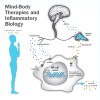Mind-body therapies and control of inflammatory biology: A descriptive review
- PMID: 26116436
- PMCID: PMC4679419
- DOI: 10.1016/j.bbi.2015.06.012
Mind-body therapies and control of inflammatory biology: A descriptive review
Abstract
The use of mind-body therapies, including Tai Chi, Qigong, yoga, and meditation, has grown steadily in recent years. These approaches have been shown to be effective in reducing symptoms and improving quality of life, and research has begun to examine the impact of these therapies on biological processes, including inflammation. A review of 26 randomized controlled trials was conducted to describe the effects of mind-body therapies (MBTs) on circulating, cellular, and genomic markers of inflammation. This qualitative evaluation showed mixed effects of MBTs on circulating inflammatory markers, including CRP and IL-6, and on measures of stimulated cytokine production. More consistent findings were seen for genomic markers, with trials showing decreased expression of inflammation-related genes and reduced signaling through the proinflammatory transcription factor NF-κB. Potential mechanisms for these effects are discussed, including alterations in neuroendocrine, neural, and psychological and behavioral processes.
Keywords: Inflammation; Meditation; Qigong; Review; Tai Chi; Yoga.
Copyright © 2015 Elsevier Inc. All rights reserved.
Figures

References
-
- Audette JF, Jin YS, Newcomer R, Stein L, Duncan G, Frontera WR. Tai Chi versus brisk walking in elderly women. Age Ageing. 2006;35(4):388–393. - PubMed
-
- Barnes PM, Bloom B, Nahin RL. Complementary and alternative medicine use among adults and children: United States, 2007. Natl Health Stat Report. 2008;12:1–23. - PubMed
Publication types
MeSH terms
Substances
Grants and funding
LinkOut - more resources
Full Text Sources
Other Literature Sources
Medical
Research Materials
Miscellaneous

